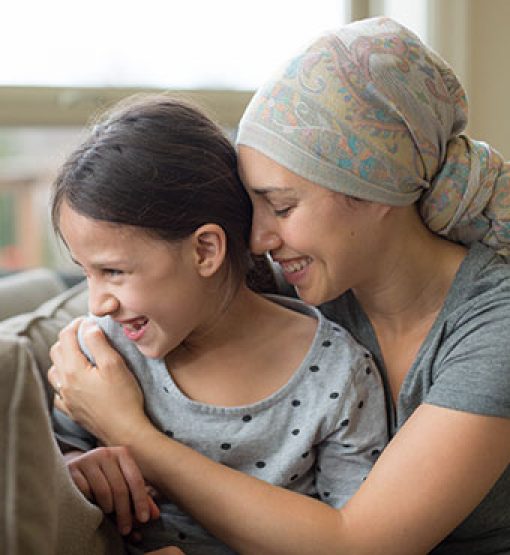The Importance of Nutrition during Chemotherapy

Cancer is a group of diseases of various origins in which our healthy cells become abnormal, continuously dividing without stopping. Apoptosis, or programmed cell death, is a mechanism used by our bodies that causes damaged or old cells to die, preventing overgrowth of these harmful, malignant cells. In healthy tissue, apoptosis keeps our cell growth in check. In cancer cells, this mechanism used to kill damaged cells is altered, allowing abnormal cells to multiply and spread into neighboring tissues (National Cancer Institute, 2015). While genetics play a key role in cancer, other factors such as your exposure to tobacco, ultraviolet rays, and radiation, or your diet and nutrition may contribute to DNA changes that initiate or promote cancer growth (National Cancer Institute, 2015).
The Role of Diet in Cancer Growth
Diet is a modifiable behavior. Many cancer patients (and cancer survivors) strive to make dietary changes as a way to take their cancer diagnosis into their own hands and “grab the bull by its horns” so to speak. While the role of sugar in cancer growth continues to elicit mixed reviews, here is what we know. Carbohydrates (i.e. glucose or “sugar”) are our body’s main source of fuel or energy (Smith, 2017). All of our cells – normal and abnormal, healthy and malignant, non-cancerous and cancerous – use sugar as a fuel source. When sugar/carbohydrates are not readily available, the body turns to fats and proteins to use as energy (Smith, 2017). This process requires a lot more work than simply converting sugar into adenosine triphosphate (ATP) to use as energy.
Cancerous cells are fast-growing cells, requiring large amounts of energy to continue to live and grow. Similarly, our normal cells also require this same energy. Therefore, while cancerous cells do thrive off of sugar, there is no way to discern how much glucose cancerous cells utilize in comparison to healthy cells. While there isn’t a direct link between sugar and cancer (i.e. sugar causes cancer), indirect links between obesity and cancer have been identified (Espat, 2015; Tontonoz, 2016), and obesity has been associated with an increased risk of 13 different types of cancers (Smith, 2017). Increased body fat is associated with increased inflammation. When our bodies are inflamed, we have a higher risk of DNA damage, which is one of the theories behind obesity and an increased risk of cancer (Tontonoz, 2016).
Therefore, in an effort to stem the obesity epidemic, researchers, dieticians and health professionals suggest limiting added sugar in our diets (Smith, 2017). It is recommended that women limit their daily sugar intake to less than 25 grams (6 teaspoons), while men should aim to eat less than 37 grams (9 teaspoons) (Espat, 2015). Even if you don’t consume sugar-sweetened beverages, many foods contain hidden sugars. For example, sugar is typically added to pasta sauces, condiments, and salad dressings, and is often labeled under unfamiliar names (e.g. fructose, sucrose, dextrose) (Espat, 2015). Even more alarming, certain sugar derivatives, such as fructose, have been linked to more malignant and aggressive cancer phenotypes (Port, Ruth, & Istfan, 2012).
Why Some Cancer Patients Turn to the Ketogenic Diet
Although documented for nearly a century, only within the past decade has the “Warburg Effect” been closely studied. We now know that cancer cells have an altered metabolic pathway where these cells convert glucose into lactic acid through fermentation even though oxygen is still present (Liberti & Locasale, 2016). Because cancer cells thrive off of glucose and require large amounts of glucose to continue their growth, diet has become a focus for researchers. One theory is to use a ketogenic (high-fat, low-carb/protein) diet and to provide exogenous Beta-Hydroxybutyrate (BHB) to deprive the body of glucose during cancer treatments as an adjunct/complementary treatment to pharmacologic interventions (Woolf et al., 2016). This forces the body to use fat as energy instead of glucose for ATP production (Allen et al., 2014). A ketogenic diet is believed to reduce the amount of circulating glucose, while fueling healthy cells with ketones, potentially targeting the Warburg Effect (Woolf et al., 2016). Low-carbohydrate diets have been linked to decreased tumor growth. One study found that mice consuming a diet comprised of 20% carbohydrates compared to mice consuming a Western diet comprised of 49% carbohydrates experienced slower prostate tumor growth (Caso et al., 2013).
Medical Treatment Negated by Poor Nutrition
Nearly all cancer patients have had at least one, if not many, inpatient hospital stays during their course of treatment. While providers have focused largely on pharmacological means to “fight” cancer, minimal attention has been paid to diet. Efforts to fight cancer could be negatively impacted by serving cancer patients hospital meals that include sugary beverages, artificial ingredients, and carbohydrate-laden processed foods. Hospital food must be made quickly, inexpensively, and in large quantities to serve the needs of patients and their families, but the time and money saved could be costing patients their health. Perhaps food and beverages with artificial ingredients and added sugars should be eliminated from hospitals, and treatment plans should take a more holistic approach, incorporating nutrition as a complement to the medical treatment being provided.
Conclusion
Cancer cells are constantly multiplying, requiring high amounts of glucose necessary for these cells to maintain their rate of growth. While there are mixed reviews about the importance of nutrition during cancer treatment (i.e. chemotherapy), there is no downside to minimizing or eliminating foods and beverages containing sugar and artificial additives. This will take away some of the fuel for cancer growth and may potentially improve the chances of going into remission.
References
- Allen, B. G., Bhatia, S. K., Anderson, C. M., Eichenberger-Gilmore, J. M., Sibenaller, Z. A., Mapuskar, K. A., . . . Fath, M. A. (2014). Ketogenic diets as an adjuvant cancer therapy: History and potential mechanism. Redox Biol, 2, 963-970. doi: 10.1016/j.redox.2014.08.002
- Caso, J., Masko, E. M., Ii, J. A., Poulton, S. H., Dewhirst, M., Pizzo, S. V., & Freedland, S. J. (2013). The effect of carbohydrate restriction on prostate cancer tumor growth in a castrate mouse xenograft model. Prostate, 73(5), 449-454. doi: 10.1002/pros.22586
- Espat, A. (2015). Does sugar cause cancer? Retrieved September 27, 2017, from http://www.mdanderson.org/publications/focused-on-health/may-2015/FOH-cancer-love-sugar.html
- Liberti, M. V., & Locasale, J. W. (2016). The Warburg Effect: How Does it Benefit Cancer Cells? Trends in Biochemical Sciences, 41(3), 211-218. doi: 10.1016/j.tibs.2015.12.001
- National Cancer Institute. (Updated February 9, 2015). What is Cancer? Retrieved September 28, 2017, from http://www.cancer.gov/about-cancer/understanding/what-is-cancer
- Port, A. M., Ruth, M. R., & Istfan, N. W. (2012). Fructose consumption and cancer: is there a connection? Current Opinion in Endocrinology, Diabetes, and Obesity, 19(5), 367-374. doi: 10.1097/MED.0b013e328357f0cb
- Smith, E. (2017). Sugar and cancer – what you need to know. Retrieved September 27, 2017, from http://scienceblog.cancerresearchuk.org/2017/05/15/sugar-and-cancer-what-you-need-to-know/
- Tontonoz, M. (2016). No Sugar, No Cancer? A Look at the Evidence. Retrieved September 27, 2017, from http://www.mskcc.org/blog/no-sugar-no-cancer-look-evidence
- Woolf, E. C., Syed, N., & Scheck, A. C. (2016). Tumor Metabolism, the Ketogenic Diet and beta-Hydroxybutyrate: Novel Approaches to Adjuvant Brain Tumor Therapy. Frontiers in Molecular Neuroscience, 9, 122. doi: 10.3389/fnmol.2016.00122




